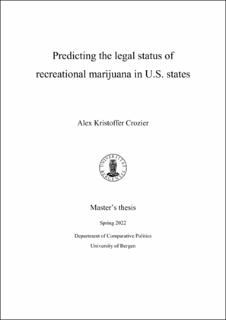| dc.description.abstract | Following decades of a war on drugs in the United States and the demonization of marijuana, a wave of recreational legalization began in 2012 with Washington state and Colorado. Recreational marijuana legalization is a novel phenomenon, both within and outside the U.S. borders. This thesis adds to the marijuana legalization research by creating prediction models that classifies observations (state-year) on whether U.S. states have legalized recreational marijuana or not in the timespan 2010 to 2018. It addresses the following research question: ‘To what extent, and how, is it possible to predict if a state has legalized recreational marijuana in the United States?’ I have drawn from theories and literature that explain why policies change, as well as from theories and literature on why individuals support marijuana legalization. My focus is on public opinion and policy responsiveness. Such theories and literature play an important role in predicting and describing states that have legalized recreational marijuana. A wide range of data sources have been used in order to create the best predictive model possible. For instance, data from such as the General Social Survey and United States Census Bureau have been used to create input variables. Furthermore, the machine learning iteration of multilevel regression with post-stratification is central in terms of this thesis’ data. This method, using the R package autoMrP, has allowed for the simulated disaggregation of the nationally representative public opinion variable in the General Social Survey. Tree-based classification algorithms, shrinkage methods and support vector machines have been used to predict the legality of marijuana. A focus on description using machine learning (ML) has been done due to what I see as necessities and to illustrate the use of ML in the social sciences – even when traditional regression models were a viable alternative. Having created multiple models, support vector machines and gradient boosting machines proved to be the best prediction algorithms. In terms of how marijuana legality is best predicted, the abstraction of individual-level determinants, and the use of public opinion and medical legalization as input variables are central aspects of creating strong predictive models of recreationally legal marijuana. This thesis concludes with the need for studying medical legalization and its relationship to recreational legalization. This is because the results show that medical legalization is important in predicting recreational legality. | |
